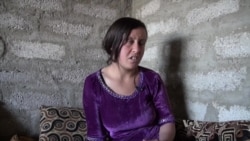The Kurdish regional government in northern Iraq has mounted costly rescues of women and girls kidnapped by Islamic State militants, spending tens of thousands of dollars to fund the operations. Upon their return, however, many women say they feel emotionally and physically devastated.
Rescued late last month, Bahar tells a story of another grandmother who, like herself, was held by Islamic State militants for more than two years.
The woman, Bahar says, complained and was beaten with a stick.
"They kidnapped many of her family members, all of her daughters and her daughters-in-law," she said. "She yelled at them, saying, ‘You destroyed my family!' A militant with a big stick hit her and shouted, ‘Enough!’
"He cracked her head and she needed seven stitches. Her arm was in bandages for a month. The shouts of the girls watching would reach to God," Bahar said.
Older women, Bahar says, were viewed as "useless" by the militants, and dragged from prison to prison, and those that survived were beaten if they complained.
"Living there was all fear," she said.
Women were sold for "marriage" — a euphemism for sexual slavery — and, even though they had almost no capacity to resist, they were raped violently.
"The most difficult thing was when they raped 10- or 12-year-old girls," said Khalifa, a 22-year-old mother of two who was held by IS militants for more than a year. "They would take babies from their mothers' arms and chop off their heads. The things they have done to us — God would not accept it."
Yazidi cities and villages lie largely in ruins, and rescued victims like Khalifa and Bahar often return to find their homes destroyed and their families living in camps or abandoned villages.
Included among the more than 3,000 people who are missing are children, babies and men, says Khalifa. Both women still have relatives and friends in IS captivity.
"I fled, but I left my friends behind," Kahlifa said quietly.
And as the Iraqi Army pushes into Mosul hoping to expel Islamic State militants, officials say the militants are further isolating their hostages, making it harder than ever to conduct rescues.
"We don't know where our people are," Khalifa said. "Our men are in their hands and we know nothing about them. Our sisters and our children are missing."






